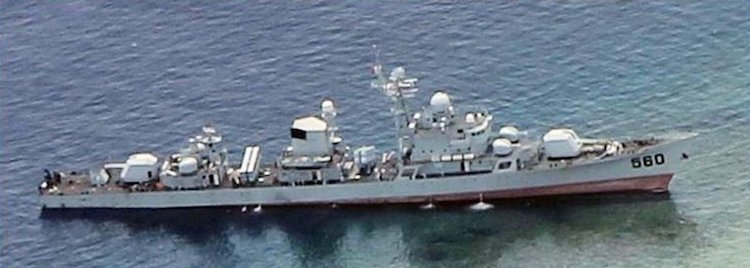Viewpoint by Christian Vicedo
The writer is Senior Defense Research Officer in the Research and Special Studies Division, National Defense College of the Philippines (NDCP). The views expressed are the author’s own and do not reflect the official position of the NDCP. EastAsiaForum first carried this article on 2 August 2018. – The Editor
MANILA (IDN-INPS) – When U.S. Defence Secretary James Mattis met with Chinese President Xi Jinping on June 28, 2018, he conveyed Washington’s growing concern over Beijing’s military activities in the South China Sea (SCS). In response Xi stressed that Beijing “cannot lose one inch” of its territory.
This bold statement portends a more challenging time for U.S. President Donald Trump’s ‘Free and Open Indo-Pacific’ (FOIP) strategy and raises the question of how regional U.S. allies and partners like the Philippines may respond to the FOIP.
The FOIP strategy is the encapsulation of U.S. security interests as a status-quo power in the Indo-Pacific region. ‘Free’ pertains to the freedom of sovereign nations from coercion, while ‘open’ refers to open sea lines of communication and airways.
A crucial aspect of the FOIP is that it seeks to challenge China’s behaviour in the SCS. Speaking at the 2018 Shangri-La Dialogue, Secretary Mattis underscored that Beijing’s militarisation of artificial features in the SCS – including the deployment of surface-to-air and anti-ship cruise missiles, installation of electronic jammers and test-landing of a nuclear-capable bomber – runs in stark contrast to the policy of openness that the FOIP promotes.
The FOIP presents an opportunity for the Philippines to be part of a loose coalition of states that are willing and able to counter unilateral Chinese behaviour in the SCS and to preserve the rules-based regional order. As outlined in the 2018 U.S. National Defense Strategy, the United States seeks to transform its system of alliances and security partnerships in the Indo-Pacific into a “networked security architecture capable of deterring aggression, maintaining stability, and ensuring free access to common domains”.
U.S. allies and security partners have started to orient their policies towards these objectives. Japan has adopted a FOIP strategy that seeks to connect the SCS and the Indian Ocean and to “enhance strategic collaboration” with India, Australia and the United States. Similarly, as underscored in its 2017 Foreign Policy White Paper, Australia seeks to develop its ‘Indo-Pacific partnerships’ with Japan and India in the areas of maritime security and naval capability development.
Meanwhile, Vietnam continues to explore closer maritime security and defence industry cooperation with the United States. Vietnam has also strengthened cooperation with U.S. allies through the adoption of the Vietnam-Japan Joint Vision Statement on Defense Relations and the elevation of Vietnam-Australia security relations into a strategic partnership.
The FOIP also presents an opportunity for the Philippines to develop its defence capabilities. On June 20, 2018, Philippine President Rodrigo Duterte approved a budget of U.S.$5.6 billion to fund the Armed Forces of the Philippines (AFP) Modernization Program Horizon 2. The program aims to transform the AFP from an internal security-oriented military to an external security-capable armed force with advanced defence and maritime security capabilities.
The United States’ commitment to increase defence investment in, improve interoperability with and prioritise requests for military equipment sales to its regional partners as part of its FOIP strategy could assist the AFP in this modernisation effort.
Under the 2014 Enhanced Defense Cooperation Agreement, the Philippines agreed to authorise the rotational access of U.S. troops to agreed locations within Philippine territory. During the 2017 Philippine-U.S. Bilateral Strategic Dialogue, both countries affirmed their commitment to “uphold freedom of navigation and overflight” in the SCS. These legal and political commitments provide a substantive basis for the United States to call upon the Philippines to support the FOIP and its freedom of navigation operations (FONOPS) in the SCS.
But the Philippines’ continued support for U.S. FONOPS and potential engagement with the FOIP strategy will depend on future developments in the SCS. While the Philippines–U.S. alliance remains intact, the Philippines still seeks to defuse tensions in the SCS and promote closer economic ties with Beijing.
The Philippines has communicated to China certain red lines in the SCS that it should not cross. These include the construction of Chinese facilities on Scarborough Shoal, any attempt to remove the BRP Sierra Madre (a grounded ship that the Philippine Navy uses as a military outpost) from Second Thomas Shoal, any attempt to harass Filipino soldiers on resupply or repair missions, and unilateral exploitation of the SCS’s natural resources.
Similar to how former Philippine president Benigno Aquino shifted his foreign policy stance from equi-balancing to balancing China after the 2012 Scarborough Shoal stand-off, Duterte may adopt a more assertive stance towards China should any of these red lines be crossed.
Consistent with Duterte’s current efforts to improve bilateral relations with China, the Philippines’ participation in a coalition of states in support of the FOIP and the regional rules-based order is likely to transpire only if China crosses any of the SCS red lines.
On the other hand, consistent with the Philippines’ National Security Strategy, which acknowledges the need to “increase the size and deterrent capability” of the AFP, it is likely that the Philippines will readily support the FOIP strategy in the context of enhancing its defence ties with the United States.
In short, unless developments in the SCS compel Duterte to radically shift his China stance, the Philippines’ engagement with the FOIP can be expected to be partial at best. [IDN-InDepthNews – 05 August 2018]
Image: The Chinese frigate, Dongguan, was temporarily grounded near Half Moon Shoal in 2012. Credit: Wikimedia Commons.
IDN is flagship agency of the International Press Syndicate.
facebook.com/IDN.GoingDeeper – twitter.com/InDepthNews

